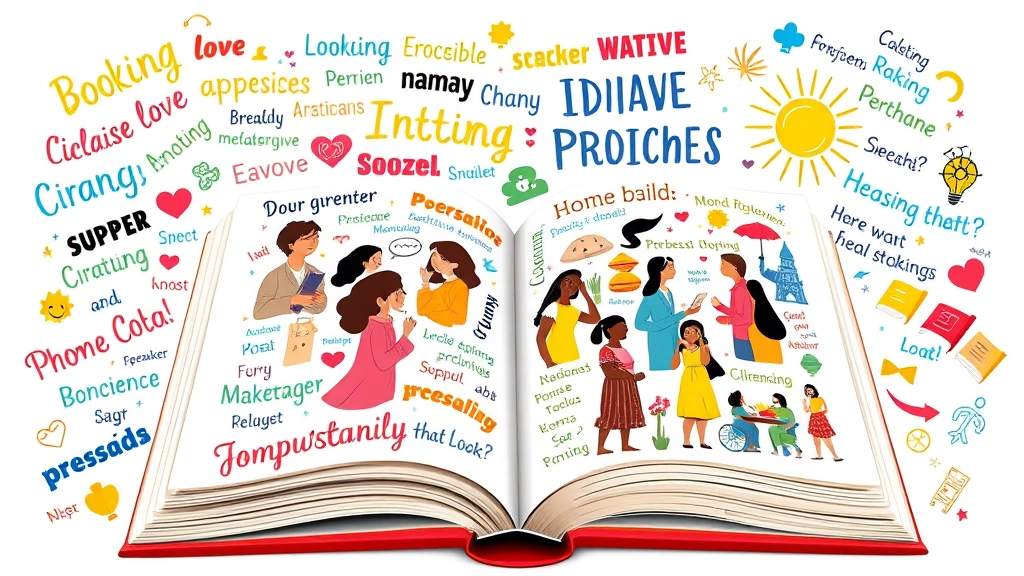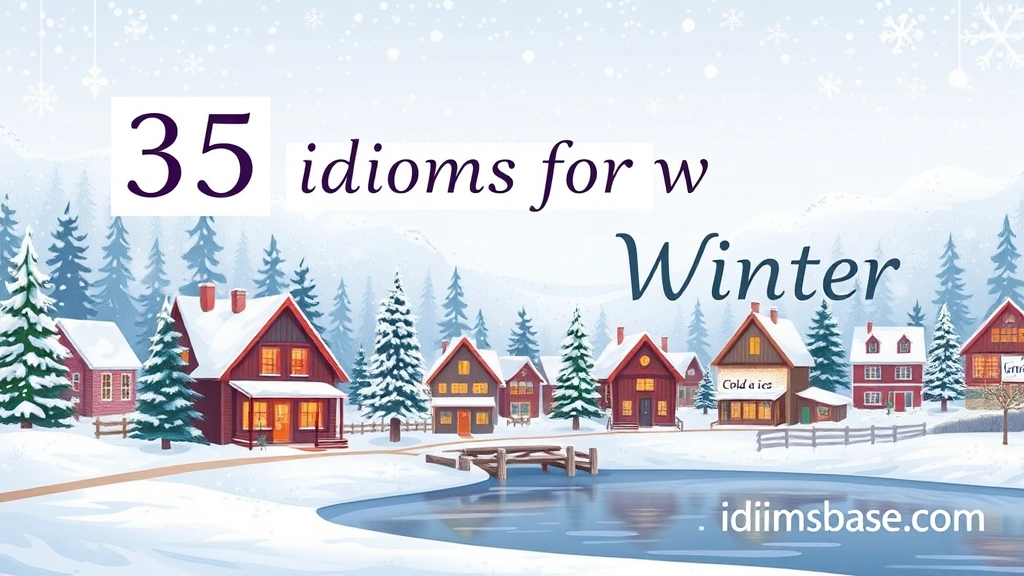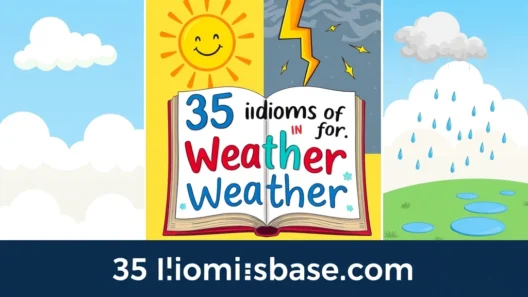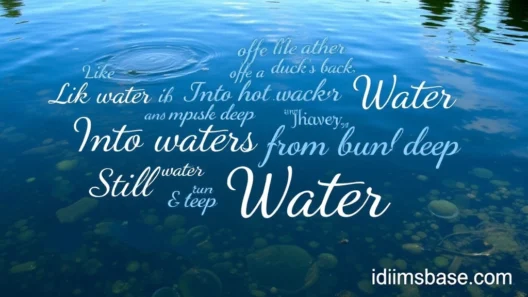Brrr! Do you feel that chill in the air? Winter is truly a magical season, isn't it? It brings with it cozy nights, warm drinks, and perhaps even a blanket of sparkling snow. But beyond the beautiful scenery, winter also inspires a wealth of fascinating idioms that paint vivid pictures with words.
Have you ever wondered how to describe the feeling of being really cold without just saying "cold"? Or perhaps you've wanted to talk about a difficult time using a wintery metaphor? Well, you're in for a treat! We're about to dive into 35 fantastic idioms that will not only enrich your vocabulary but also help you understand and express yourself better, especially when the temperatures drop. Get ready to add some frosty flair to your conversations!
35 Wonderful Winter Idioms to Warm Up Your Vocabulary
Let's explore these cool expressions, each bringing a unique nuance to your language.
- Break the ice: To start a conversation in a social situation, especially with someone you haven't met before. It can be hard to break the ice at a new job, but a friendly smile often helps.
- Cold snap: A sudden, short period of very cold weather. We're expecting a cold snap next week, so bundle up!
- Snowed under: To have too much work or too many things to do. I'm completely snowed under with assignments this week.
- Put something on ice: To postpone or delay something. Let's put that project on ice until we have more resources.
- Ice in one's veins: To be extremely calm and not show emotion, especially in a stressful situation. The surgeon had ice in his veins during the complex operation.
- Walk on thin ice: To be in a risky or dangerous situation. You're walking on thin ice if you keep missing deadlines.
- Give someone the cold shoulder: To act in an unfriendly way towards someone. After their argument, she gave him the cold shoulder all evening.
- Cold feet: A loss of courage or confidence at the last minute, especially before an important event. He got cold feet before the wedding and almost called it off.
- Cold spell: A period of cold weather, often longer than a cold snap. This cold spell has lasted for weeks; I can't wait for spring!
- In the dead of winter: The coldest, darkest part of winter. Finding fresh fruit in the dead of winter used to be very difficult.
- Freeze over: When a body of water turns to ice. The pond might freeze over tonight if the temperature drops enough.
- Nip in the air: A slight feeling of coldness in the air. There's a definite nip in the air this morning, signaling winter's arrival.
- Chasing rainbows: Pursuing something impossible or unlikely to happen. He's always chasing rainbows, hoping to strike it rich overnight.
- White Christmas: A Christmas with snow on the ground. Everyone dreams of a white Christmas, but it's rare where I live.
- To be on ice: To be held in reserve or kept for later. That bottle of champagne is on ice for a special occasion.
- Melt someone's heart: To make someone feel loving and sympathetic. The puppy's big eyes melted her heart instantly.
- Bundle up: To put on warm clothes. It's freezing outside, so make sure you bundle up!
- Leave someone out in the cold: To exclude someone from a group or activity. They left him out in the cold when they made plans without inviting him.
- Snowball effect: A situation in which something increases in size or importance at a faster and faster rate. The small misunderstanding quickly turned into a huge argument due to a snowball effect.
- As cold as ice: Very cold, either literally or referring to a person's lack of emotion. Her response was as cold as ice, showing no sympathy.
- The tip of the iceberg: Only a small, visible part of a much larger, hidden problem or situation. The problems we're seeing now are just the tip of the iceberg.
- Winter blues: Feelings of sadness or depression during the winter months. Many people experience the winter blues when the days get shorter.
- To weather the storm: To survive a difficult period. They managed to weather the storm of the economic recession.
- A snowball's chance in hell: No chance at all. He has a snowball's chance in hell of winning the lottery without buying a ticket.
- Get the cold shoulder: To be intentionally ignored or treated in an unfriendly way. She got the cold shoulder from her colleagues after the argument.
- Chill out: To relax or calm down. Just chill out, everything will be fine.
- Skate on thin ice: To take a risk or do something dangerous. You're skating on thin ice by not studying for your exams.
- Warm up to someone/something: To start to like or feel comfortable with someone or something. It took a while for her to warm up to her new classmates.
- To be a fair-weather friend: Someone who is a friend only when things are easy or convenient. He disappeared as soon as I had financial troubles; he's just a fair-weather friend.
- Winter warmer: Something, especially a drink or food, that makes you feel warm in cold weather. A hearty stew is a perfect winter warmer.
- Left out in the cold: Excluded or ignored. I felt left out in the cold when they went out without me.
- To have a winter coat: (Informal, often referring to animals) To grow thick fur for winter. My dog is starting to get his winter coat now.
- Snow day: A day when school or work is canceled due to heavy snowfall. Kids love a snow day because they get to stay home and play!
- Catch your death of cold: To get a very bad cold or illness from being out in cold weather. Put on a hat, or you'll catch your death of cold!
- The calm before the storm: A period of unusual quiet before a period of great activity or trouble. The office was quiet, but it was just the calm before the storm of the big product launch.
Key Takeaways
- Expand Your Vocabulary: Incorporating these idioms makes your English more colorful and precise.
- Understand Native Speakers: Many of these are common in everyday conversation, helping you grasp nuances.
- Express Yourself Creatively: Idioms offer unique ways to describe feelings, situations, and even weather.
- Connect with Culture: Language is deeply tied to culture, and idioms offer a peek into shared experiences and historical contexts.

Frequently Asked Questions
Q1: Why are idioms important in English?
Idioms are super important because they add richness and depth to the language. They allow you to express complex ideas or emotions in a concise and often vivid way. Think of them as shortcuts that paint a picture with words! Plus, understanding idioms is key to truly grasping casual conversations and native speaker nuances.
Q2: How can I remember so many idioms?
Great question! The best way to remember idioms is by using them. Try incorporating one or two new idioms into your conversations each week. You can also create flashcards, draw pictures that represent the idiom's meaning, or even try writing short stories using them. Repetition and context are your best friends here!
Q3: Are winter idioms only used in winter?
Not at all! While many of these idioms have their roots in wintery scenarios, their meanings are often metaphorical and can be used year-round. For example, "breaking the ice" or "cold feet" can happen at any time, regardless of the season. The winter imagery just helps us understand the origin of the expression!
Q4: Can I use these idioms in formal writing?
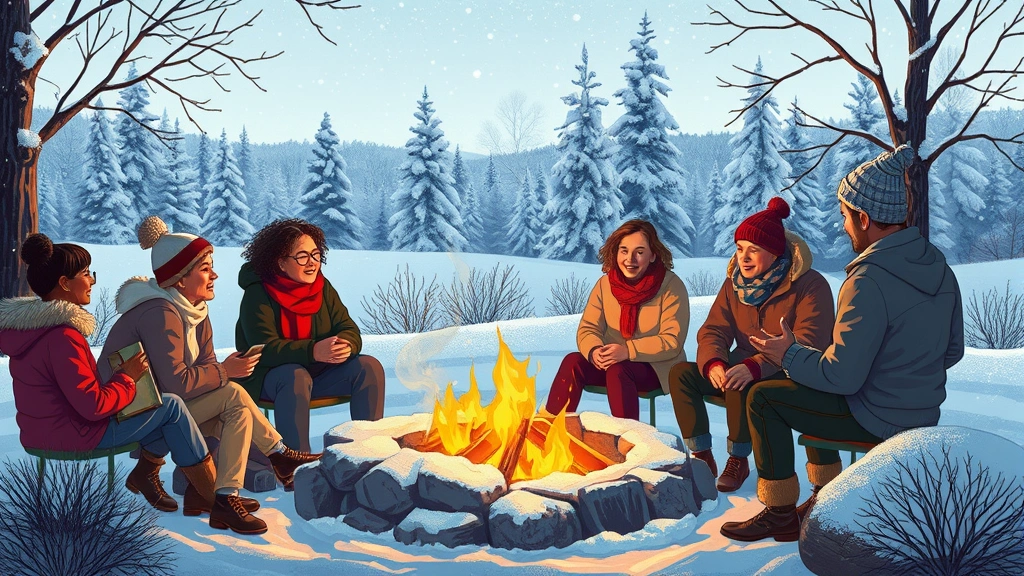
It depends! Some idioms, like "the tip of the iceberg" or "weather the storm," are widely accepted in both formal and informal contexts. However, others, like "chill out" or "catch your death of cold," are more informal. When in doubt, it's always best to stick to more direct language in very formal academic or professional writing.
Q5: Where do idioms come from?
Idioms often come from historical events, common practices, literature, or observations of the natural world. Many have evolved over centuries, their original literal meanings transforming into the figurative expressions we use today. They're like little linguistic time capsules!
Conclusion
Wasn't that a fun journey through the frosty world of winter idioms? We hope you feel a little warmer and a lot smarter after exploring these 35 wonderful expressions. From "breaking the ice" to "the calm before the storm," these idioms are fantastic tools to make your English more expressive and engaging.
So, go ahead! Pick a few favorites and start weaving them into your conversations. You'll not only impress others with your linguistic flair but also gain a deeper appreciation for the colorful tapestry of the English language. Keep practicing, keep learning, and keep your vocabulary as vibrant as a winter wonderland!
